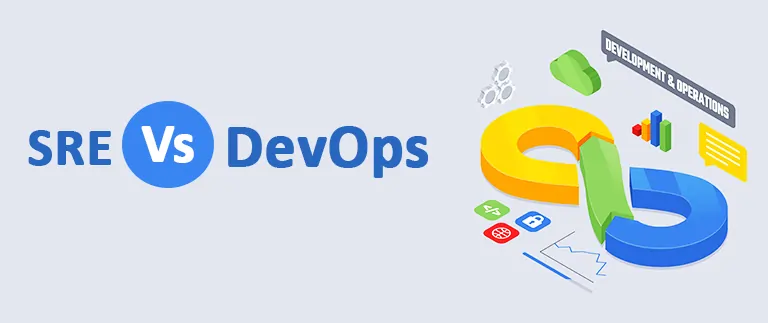There is a high demand for reliable software systems. So, Site Reliability Engineer (SRE) and DevOps have popped up as two prominent positions in the technology sector. While both positions try to improve reliability and performance, there are some distinctions between them. Let’s check SRE vs DevOps. Also, it’ll help us understand the approach of each role, their functions, and roles.
What is SRE?
Site Reliability Engineering includes software development and operations to guarantee the efficiency and reliability of software. Managing complex, large-scale systems is the prime goal. SREs can create and maintain highly reliable and efficient software capable of handling vast usage.
These professionals use a data-driven approach to monitor and analyze the performance of systems. Also, they identify areas that require quick fixes and implement changes to improve efficiency. SREs communicate with developers to ensure integration of new features or updates into the product.
What is DevOps?
The DevOps approach is a cultural methodology in software development and delivery. It cements the gap between development and operations teams through collaboration, communication, and automation. DevOps improves the quality and reliability of software releases by communicating with different teams for a continuous delivery model.
Development Operations teams automate the development process, from code creation to deployment and monitoring. They use continuous integration and delivery for faster, more reliable software.
Differences Between DevOps and SRE
Both concepts try to enrich efficiency and performance, but there is some distinction between them. Here’s the difference between SRE and DevOps.
Focus
The main aim of SREs is to ensure reliability and scalability of software applications. They ensure that systems are highly efficient to handle high usage. SREs assess performance, find areas of improvement, and employ changes.
DevOps focuses on the complete software development and release process. The approach tries to improve communication, collaboration, and automation throughout the development life cycle. The experts automate the processes, monitor performance, and ensure a continuous delivery of software.
Skillset and Background
In SRE vs. DevOps, the former experts have a background in software engineering with a strong understanding of coding, algorithms, and data structures. They are also familiar with architecture, networking, and operating systems. SREs use techniques to monitor, assess, and optimize performance.
DevOps experts are from software development, system administration, or quality assurance backgrounds. They have a broad understanding of the developer process. Also, these professionals are skilled in using various tools/practices for automation and delivery.
Problem Solving Approach
SREs use a data-driven technique. They assess threat metrics. These experts rely on data for decision-making. Plus, they use error budgeting to balance new features and system stability.
DevOps teams, on the other side, prioritize fast, efficient problem-solving. They employ automation, collaboration, and continuous delivery to address software development issues.
Reporting Structure
When checking SRE vs. DevOps, you understand that former professionals report to the ops or infrastructure team. They prioritize reliability and performance. Development Operations teams collaborate with and report to both dev and ops teams.
DevOps and SRE experts share the goal of improving software reliability and performance. However, they have different approaches and responsibilities. SREs focus on system reliability, while DevOps teams handle software development. Both roles are vital for delivering quality products in tech.
Requirements of SRE and DevOps Role
Software engineer roles have greatly evolved now. The growing complications of development and the need for continuous delivery have made the roles of SRE and DevOps engineers crucial. These responsibilities warrant technical expertise and a deep understanding of the business.
So, what are the role requirements? Let’s explore crucial skills and qualities for a successful SRE or DevOps engineer.
- Strong Technical Skills
Both SRE and DevOps roles require strong coding and system administration skills. These roles warrant proficiency in Python, Java, Linux, Docker, and Kubernetes. A solid grasp of networking, security, and infrastructure is vital for maintaining reliable and stable systems.
- Automation Skills
Both DevOps and SRE automate tasks to reduce errors and improve efficiency. This warrants expertise in configuration management tools and scripting languages. A solid grasp of CD/CI pipelines is a must for automating software delivery.
- Problem-solving Capabilities
SRE and DevOps roles require prompt resolution for unforeseen issues. You should have problem-solving skills, must troubleshoot complex systems, and understand root cause analysis. Engineers must think critically to make pressure-driven decisions.
- Communication Skills
SRE and DevOps engineers communicate with developers, operations, and QA. Effective teamwork warrants proper communication and collaboration skills. Engineers must convey complex technical ideas to stakeholders with simplicity and clarity.
- Business Acumen
SRE and DevOps roles demand technical skills and business understanding. Engineers must align work with company goals and understand products and users deeply. This helps to make informed decisions, benefiting the entire business.
- Continuous Learning
SRE and DevOps engineers must be updated with evolving technology. Continuous learning is essential. Engineers should adapt to new technologies and processes. They must learn from colleagues, fostering a growth mindset.
SRE and DevOps require diverse skills and qualities. The roles command technical expertise, automation, problem-solving abilities, collaboration, communication capabilities, business acumen, and a thirst for continuous learning. Organizations must ensure their SRE and DevOps teams possess the necessary skills and qualities for building a robust and reliable software system. With efficient people, SRE and DevOps engineers can facilitate rapid software delivery by implementing effective processes and tools.
Career Prospects for SRE and DevOps Engineers
Both of these tech experts play vital roles to ensure smooth software system functioning. So, skilled professionals in SRE and DevOps stay in the limelight, boosting career prospects in these fields.
The high demand originates from the growing cloud computing adoption and automated software development and deployment. The gap between developers and IT operations teams has created a need for these professionals.
The rise of microservices architecture has also resulted in more career prospects for SRE and DevOps engineers. This approach involves partitioning big applications into smaller, independent services for separate deployment and management. Both engineers are necessary for coordinating microservices effectively, making their skills highly desired.
Moreover, companies seek professionals for implementing and managing automated pipelines for development, testing, and deployment, due to the growing focus on continuous integration and delivery (CI/CD). SRE and DevOps engineers excel in designing and efficiently implementing these processes.
Career prospects for DevOps and SRE engineers are promising. Glassdoor reports that SRE engineers make $124,000 per year compared to DevOps engineers’ salary of $115,000. These salaries are higher compared to other IT roles, showcasing a heavy demand.
Also, SRE and DevOps engineers have various options in finance, healthcare, e-commerce, and more. They can work in diverse environments, from startups to large corporations and gain varied experiences and challenges.
So, their future appears bright and promising. As cloud computing, microservices architecture, and continuous integration gain traction, the demand for skilled professionals will increase. So, if you’re checking site reliability engineering vs DevOps, know that both fields have immense potential. You can make a great career if you have proper skills and experience.
SRE and DevOps Engineers Roles and Salaries
Although similar in responsibilities, these roles differ in their focus and approach. Let’s explore SRE vs DevOps experts’ roles, salaries, and contributions to tech organizations’ success.
SRE Engineers:
These professionals ensure software reliability and performance. SRE Engineers collaborate with developers to create scalable systems for large data sets and complex architectures. They resolve issues and safeguard end-users by using automation and incident response.
SRE engineers must have knowledge of software development, cloud computing, and infrastructure management. The professional should also possess good communication skills to handle pressure.
The average salary for a Site Reliability Engineer is ₹13,86,036 per year in India.
DevOps Engineers:
The Development Operations approach cements the gap between software development and operations by embracing cultural and technical aspects. DevOps engineers streamline software application building, testing, and deployment.
They collaborate with development and operations teams to enhance processes and tools for faster product delivery. They also ensure software infrastructure security and stability.
The minimum salary of a DevOps Engineer is ₹5,50,000 per annum, which may increase to ₹1,500,000 to ₹1,800,000 per annum.
SRE vs DevOps Engineers:
Both engineers emphasize automation and collaboration but differ in their primary objectives. SRE engineers stress system reliability and performance. DevOps engineers focus on software delivery speed and quality. SRE experts align with operations teams, while DevOps with development.
In organizations, roles often combine or overlap, with engineers taking on responsibilities from both disciplines. This is especially true in smaller companies lacking resources for separate SRE and DevOps teams.
Both engineers are essential for reliable tech organizations. Their responsibilities and salaries may vary, but each of them is vital for efficient software systems. With technological advancement, the demand for these positions will grow, making them appealing for aspiring tech professionals.
Similarities Between SRE and DevOps
Both approaches improve software system reliability and efficiency. Despite surface differences, there are numerous similarities between the two approaches. Let’s see how DevOps and SRE work together for a better software development process, exploring their similarities in reliability and efficiency.
- Emphasize collaboration and communication.
DevOps and site reliability engineering emphasize collaboration and communication. Both methodologies stress the need to align teams, such as development, operations, and testing, by breaking down silos. This ensures better communication and collaboration, and improves teamwork, resulting in a more efficient development process. In both methodologies, teams collaborate to deliver reliable software.
- Automation is Crucial
SRE and DevOps automate tasks. Development Operations uses automation to streamline development, testing, and deployment. This reduces human error and increases efficiency. In SRE, automation oversees the entire software system. As a result, the team’s load eases, allowing them to prioritize key tasks.
- Continuous Improvement
SRE and Development Operations prioritize constant improvement. In DevOps, achieving this involves continuous integration and delivery, where code changes are continuously tested and deployed. This enables quicker delivery of updates and bug fixes. SRE achieves constant improvement through monitoring, measuring, and making necessary changes to enhance system reliability and efficiency. Both methodologies prioritize improvement for software reliability.
- Shared Responsibility
Each team in traditional software development models independently handles their responsibilities. In DevOps and SRE, teams have a shared responsibility model where each one owns different aspects of development and operations. This promotes accountability and aligns teams towards a shared goal of delivering reliable, efficient software.
- Shift Towards DevOps and SRE
Lastly, SREs are increasingly adopting DevOps practices, and vice versa. Both methodologies complement each other, working together for efficient software development.
Concluding Words
Both DevOps and SRE are vital in this tech era. Despite their different origins and approaches, these concepts share many similarities. This makes them a powerful combination for enhancing software development and operations.
The emphasis on collaboration, automation, and improvement leads to faster delivery of high-quality products. As software development evolves, we can expect more organizations adopting SRE and DevOps roles to deliver efficient, reliable applications.
FAQ's
Both fields have an edge over one other in some respects. For instance, DevOps is better at building relationships between development and operations teams. SREs ensure the software’s scalability, reliability, and performance.
The most significant difference is DevOps experts create software and refine it. On the other side, SRE teams work with already-built software to make sure it functions properly and cooperates with other applications and systems.
The average salary of a site-reliability engineer is $130,917 a year. DevOps specialists earn $133,115 per year.
Yes! The skill sets and responsibilities of SRE experts have become more diverse. SREs now fill more roles beyond development and operations. Also, some site-reliability engineers focus entirely on strategy, process, or culture.
| “Want to take your IT career to the next level? Explore our Advanced Cloud Native DevOps Master Program to enhance your DevOps career now!” |
Amol Shete
Senior Software Engineer
A well-experienced DevOps engineer who loves to discuss cloud, DevOps, and Kubernetes. An energetic team player with great communication & interpersonal skills.





